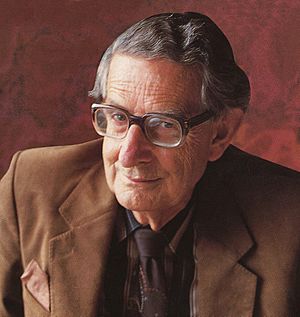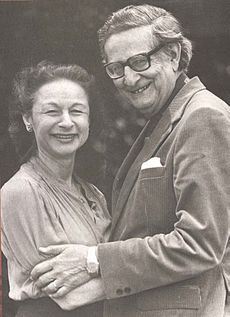Hans Eysenck facts for kids
Quick facts for kids
Hans Eysenck
|
|
|---|---|
 |
|
| Born |
Hans Jürgen Eysenck
4 March 1916 |
| Died | 4 September 1997 (aged 81) London, England
|
| Nationality | German |
| Citizenship | British |
| Alma mater | University College London (UCL) |
| Known for | Intelligence, personality psychology, Eysenck Personality Questionnaire, differential psychology, education, psychiatry, behaviour therapy |
| Scientific career | |
| Fields | Psychology |
| Institutions | Institute of Psychiatry King's College London |
| Doctoral advisor | Cyril Burt |
| Doctoral students | Jeffrey Alan Gray, Donald Prell |
Hans Jürgen Eysenck (/ˈaɪzɛŋk/ EYE-zenk; born March 4, 1916 – died September 4, 1997) was a famous psychologist. He was born in Germany but spent most of his career in Great Britain. He is best known for his work on how our minds work, especially about intelligence and personality.
Even though he was very well-known, some of Eysenck's research later faced serious questions. Scientists found problems with some of his studies, especially those about personality types and health issues like cancer and heart disease. Many of his findings could not be repeated by other researchers. An investigation by King's College London later said that some of his papers were "not compatible with modern science."
In 2019, 26 of his papers were considered "unsafe" by King's College London. By 2020, 14 of his papers were officially removed from journals (called "retracted"). Also, 64 journals issued "statements of concern" about his other publications.
During his life, Eysenck also made claims about IQ scores and race. He believed that IQ scores were mostly inherited and linked to biological race. He claimed that black children, on average, had lower IQ scores than white children. His ideas were used to support unfair schooling practices in Britain in the 1970s. However, later research has shown that Eysenck's beliefs about race and IQ are incorrect and are not accepted by modern psychology.
Contents
Hans Eysenck's Early Life and Education
Hans Eysenck was born in Berlin, Germany. His mother, Helga Molander, was a film star, and his father, Eduard Anton Eysenck, was an actor. He was raised by his grandmother, who was Jewish. She was later sent to a concentration camp and died there because of the Nuremberg laws under the Nazi regime.
Eysenck moved to England in the 1930s to escape the Nazi party. He strongly disliked Hitler and everything the Nazis stood for. Because he was German, it was hard for him to find a job at first, and he almost got put in a special camp during the war. In 1940, he earned his PhD from University College London (UCL). He studied psychology under Professor Sir Cyril Burt.
Hans Eysenck's Career and Contributions
From 1955 to 1983, Eysenck was a Professor of Psychology at the Institute of Psychiatry, which is part of King's College London. He played a big role in developing the scientific study of personality. He was also a great teacher and helped find new ways to treat mental illnesses.
Eysenck created a unique model of personality. He believed that personality could be described using different dimensions, like how outgoing or shy someone is. He tried to connect these personality traits to biology. In 1981, he became a founding member of the World Cultural Council. He also started an international journal called Personality and Individual Differences. He wrote a lot, including about 80 books and more than 1,600 articles for journals.
Hans Eysenck had a son, Michael Eysenck, with his first wife. Michael is also a psychology professor. With his second wife, Sybil Eysenck, he had four more children: Gary, Connie, Kevin, and Darrin. Hans and Sybil Eysenck worked together as psychologists for many years. Sybil Eysenck passed away in 2020. Hans Eysenck died in 1997 from a brain tumor. He did not believe in God.
The Eysencks lived at 10 Dorchester Drive, Herne Hill, London, from 1960 until they died.
Later Review of Eysenck's Work
After Hans Eysenck passed away, his work was looked at again very closely.
Another psychologist, Donald R. Peterson, wrote in 2005 that he had stopped trusting Eysenck's work years earlier. Peterson had tried to repeat one of Eysenck's studies but found that the original results seemed to be made up or changed.
King's College London Investigation in 2019
In 2019, a psychiatrist named Anthony Pelosi wrote that Eysenck's work was "unsafe." Pelosi said that some of Eysenck's research led to "one of the worst scientific scandals of all time." He described the findings as "astonishing" and "never otherwise encountered" in medical research. Pelosi pointed out that many serious concerns about Eysenck's work had been raised between 1991 and 1997, but they were never properly investigated at the time. These problematic papers were mainly about the links between personality and cancer.
After the King's College London investigation, a journal called International Journal of Sport Psychology removed a paper that Eysenck had co-written in 1990. Later, 13 more papers were removed. By the end of 2020, 14 papers had been retracted, and 71 journals had issued "expressions of concern" about Eysenck's publications, some going back to 1946.
Portraits
There are five portraits of Eysenck in the National Portrait Gallery, London. These include photographs by Anne-Katrin Purkiss and Elliott and Fry.
Biographies
- Buchanan, Roderick J. (2010). Playing with Fire: The Controversial Career of Hans J. Eysenck. Oxford University Press.
- Corr, P. J. (2016). Hans Eysenck: A Contradictory Psychology. Macmillan Education-Palgrave.
- Eysenck, Hans (1997). Rebel with a cause. Transaction Publishers.
- Gibson, H. B. (1981). Hans Eysenck: The man and his work. Peter Owen.
Works
Selected books
- Dimensions of Personality (1947)
- The Scientific Study of Personality (1952)
- The Structure of Human Personality (1952)
- Uses and Abuses of Psychology (1953)
- The Psychology of Politics (1954)
- Psychology and the Foundations of Psychiatry (1955)
- Sense and Nonsense in Psychology (1956)
- The Dynamics of Anxiety and Hysteria (1957)
- Perceptual Processes and Mental Illnesses (1957) with G. Granger and J. C. Brengelmann
- Manual of the Maudsley Personality Inventory (1959)
- Know Your Own I.Q. (1962)
- Crime and Personality (1964)
- Manual of the Eysenck Personality Inventory (1964) with S. B. G. Eysenck
- The Causes and Cures of Neuroses (1965) with S. Rachman
- Fact and Fiction in Psychology (1965)
- Smoking, Health and Personality (1965)
- Check Your Own I.Q. (1966)
- The Effects of Psychotherapy (1966)
- The Biological Basis of Personality (1967)
- Eysenck, H. J. & Eysenck, S. B. G. (1969). Personality Structure and Measurement. London: Routledge.
- Readings in Extraversion/Introversion (1971) three volumes
- Race, Intelligence and Education (1971) in US as The IQ Argument
- Psychology is about People (1972)
- Lexicon de Psychologie (1972) three volumes, with W. Arnold and R. Meili
- The Inequality of Man (1973). German translation Die Ungleichheit der Menschen. Munich: Goldman. 1978. With an introduction by Eysenck.
- Eysenck, Hans J. & Wilson, Glenn D. (1973). The Experimental Study of Freudian Theories. London: Methuen.
- Eysenck, Hans J. & Wilson, Glenn D. (1976). Know your own personality. Harmondsworth, Eng. Baltimore etc: Penguin Books.
- Manual of the Eysenck Personality Questionnaire (1975) with S. B. G. Eysenck
- Eysenck, Hans J. & Wilson, Glenn D. (1976). A Textbook of Human Psychology. Lancaster: MTP Press.
- Eysenck, H. J. & Eysenck, S. B. G. (1976). Psychoticism as a Dimension of Personality. London: Hodder and Stoughton.
- Reminiscence, Motivation and Personality (1977) with C. D. Frith
- You and Neurosis (1977)
- Die Zukunft der Psychologie (1977)
- The Structure and Measurement of Intelligence (1979)
- The Causes and Effects of Smoking (1980)
- Mindwatching (1981) with M. W. Eysenck
- The Battle for the Mind (1981) with L. J. Kamin, in US as The Intelligence Controversy
- Personality, Genetics and Behaviour (1982)
- Explaining the Unexplained (1982, 2nd edition 1993) with Carl Sargent
- H. J. Eysenck & D. K. B. Nias, Astrology: Science or Superstition? Penguin Books (1982), ISBN: 0-14-022397-5
- Know Your Own Psi-Q (1983) with Carl Sargent
- …'I Do'. Your Happy Guide to Marriage (1983) with B. N. Kelly.
- Personality and Individual Differences: A Natural Science Approach (1985) with M. W. Eysenck
- Decline and Fall of the Freudian Empire (1985)
- Rauchen und Gesundheit (1987)
- The Causes and Cures of Criminality (1989) with G. H. Gudjonsson
- Genes, Culture and Personality: An Empirical Approach (1989) with L. Eaves and N. Martin
- Mindwatching (1989) with M. W. Eysenck. Prion, ISBN: 1-85375-194-4
- Genius: The natural history of creativity (1995). Cambridge University Press, ISBN: 0-521-48014-0
- Intelligence: A New Look (1998)
Edited books
- Handbook of Abnormal Psychology (1960)
- Experiments in Personality (1960) two volumes
- Behaviour Therapy and Neuroses (1960)
- Experiments in Motivation (1964)
- Eysenck on Extraversion (1973)
- The Measurement of Intelligence (1973)
- Case Histories in Behaviour Therapy (1974)
- The Measurement of Personality (1976)
- Eysenck, Hans J. & Wilson, Glenn D. (1978). The Psychological basis of ideology. Baltimore: University Park Press.
- A Model for Personality (1981)
- A Model for Intelligence (1982)
- Suggestion and Suggestibility (1989) with V. A. Gheorghiu, P. Netter, and R. Rosenthal
- Personality Dimensions and Arousal (1987) with J. Strelau
- Theoretical Foundations of Behaviour Therapy (1988) with I. Martin
Other
- Preface to Pierre Krebs. Das Unverganglich Erbe
See also
 In Spanish: Hans Eysenck para niños
In Spanish: Hans Eysenck para niños
- Biological basis of personality
- EPQ
- Scientific racism


